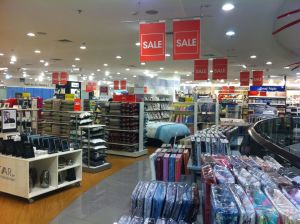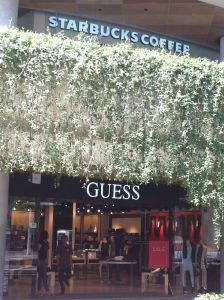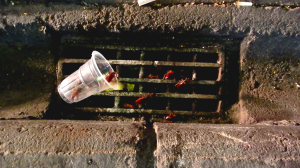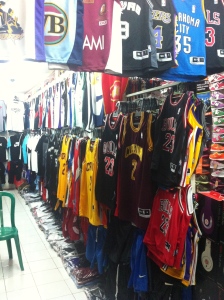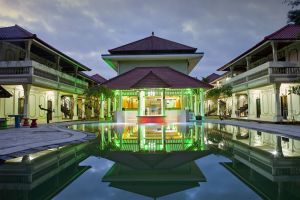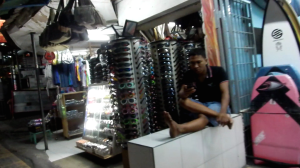ahem Before I begin, I would like to say I am a Conscientious Capitalist. That is, I believe in Capitalism, but it has a lot to learn. People are more important than companies, and profit should be the third priority, not the first. I’m an advocate of Social Enterprise (what I call Capitalism 2.0) and look forward to the inevitable evolution of capitalist thinking. It’ll be that or WWIII and I, for one, am tired of rich old men taking us to war.
As I mentioned in my “First Impressions of Indonesia“, despite a 1 trillion dollar GDP, and in 2011 being the 10th largest economy (by nominal GDP) in the world, Indonesia is considered to be a third world country.
According to Wikipedia “Third World” was used to describe countries not aligned with NATO or other “first world” countries during the cold war. It’s also been used to describe “periphery” countries, which is downright racist, but generally its used to refer to the stereotype of “poor” countries.
Except, as the 10th largest economy in the world, why is Indonesia considered a “poor” country? I’m no expert on economics, nor do I hope to explain this here. I simply want to make a few observations about what I see.
Our first week in Jakarta was an eye opener. Drive down a few back streets and its clear that this is, in fact, a third world country. But then you get on to a “nice” street and it has beautiful large houses, brand new shopping malls (with the latest in marble, metal and glass architecture), bistros, bars and clubs – none of which the average Jakartan can afford to visit, let along spend money in, but I’ll get to that.
The wealthy have their playgrounds, the poor their squalor. Ah, Capitalism 1.0 (1-point-oh).
I’m new here and I know little of Indonesia’s history, culture or economics. As a relatively wealthy, white, English speaking man I really have no right to say anything about a culture I know so little about. But then, historically, we relatively wealthy, white, English speaking men have never really cared about what we have the right to do – and that in fact is the stem of the trouble here.
It should be said that all judgement here is against “the system” – the global capitalists, the oligarchs, and most of all us–the mindless consumers. Indonesians, their land and their culture have earned my utmost respect and affection. The more we see, the more we love.
Driving through downtown Jakarta I see poverty next door to wealth, kind of like Miami, Florida. Poverty is of course relative because most people have cell phones in their hand – over 30 Million cell phones are sold here each year. This isn’t desperate levels of poverty, just enough that people need to work all day, every day, doing whatever they can to earn enough money to survive. I have heard from 4 different people that the average wage in Indonesia is about US$200/month, which doesn’t even put them on the “List of countries by average wage“. At 40 hours per week, that’s US$2.20 per hour, but it doesn’t look like many people here pack up at 5pm – most work all day, 6 days a week.
In Indonesia, the government, again despite a solid GDP, provides no social support structure for its citizens. Everyone finds work, creates work or starves. So lots and lots of the community run small businesses from small shacks along the roadside – fixing bike seats, selling any type of food, filling water bottles, collecting plastic, selling scrap metal, selling SIM cards, selling pirated DVDs, selling viagra, you name it. I doubt they fill out tax returns–I doubt they earn enough even if they were asked to, and most people couldn’t even afford a filing cabinet.
These are people with no choice but to survive yet they smile as we go past, make eye contact, and seem proud of what they’ve built, regardless how “small” it may seem to western eyes. It’s humbling and beautiful at the same time.
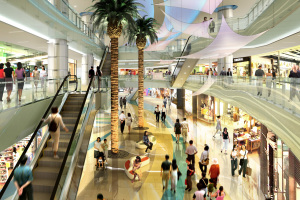 Meanwhile, a few minutes around the corner is the “2nd biggest mall in Jakarta”. It’s massive and hands down one of the nicest shopping malls I’ve ever seen. Comfortably air conditioned, well lit, and secure – we had our bags x-rayed on the way in. This is since 9/11 I’m told – the call to war that infused billions of dollars into private security corporations the world over. In Canada we had a recent “terrorist threat” by a mentally-ill Canadian with, fortunately for Stephen Harper’s narrative, dark skin and an interest in the worlds largest religion. Harper should visit Indonesia to realize not all Muslims are terrorists. Extremists are on all sides of religion.
Meanwhile, a few minutes around the corner is the “2nd biggest mall in Jakarta”. It’s massive and hands down one of the nicest shopping malls I’ve ever seen. Comfortably air conditioned, well lit, and secure – we had our bags x-rayed on the way in. This is since 9/11 I’m told – the call to war that infused billions of dollars into private security corporations the world over. In Canada we had a recent “terrorist threat” by a mentally-ill Canadian with, fortunately for Stephen Harper’s narrative, dark skin and an interest in the worlds largest religion. Harper should visit Indonesia to realize not all Muslims are terrorists. Extremists are on all sides of religion.
Sadly, this mall could be anywhere. It has all the same shops, the same sales, the same marketing propaganda, even the same smells. We could be in any nice, clean, expensive mall in America. From where I’m standing I can see Starbucks, Pedro, Debenhams, Nautical, Next, Guess, Zara, Ecco, Marks & Spencer, Charles & Keith handbags, Evernest handbags, Rotelli shoes, Braun Büffel hand bags. Everything a person could ask for on which to spend their hard earned money.
In Debenhams clothes are 70% off (CA$23 for jeans, $12 for a t-shirt – buy 1, get 1 free of course) which is ironic as most of the clothes are made down the road by the people that wouldn’t be allowed past security. Lego is still horrendously expensive, and the same useless housewares are proudly displayed. Apparently lime greens and bold reds are in vogue this season on this side of the world as well, what a coincidence.
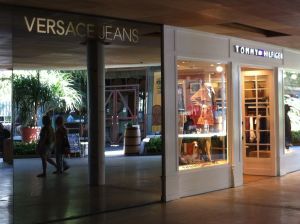 In other words, Indonesia, like the rest of the “developing” world are developing all the worst habits of American and European Consumers. The stores are supplied by the same companies. The window displays are dictated by the same marketing firms. And “Sale! Sale!” means the same thing in Indonesian as it does in English.
In other words, Indonesia, like the rest of the “developing” world are developing all the worst habits of American and European Consumers. The stores are supplied by the same companies. The window displays are dictated by the same marketing firms. And “Sale! Sale!” means the same thing in Indonesian as it does in English.
The same lighting, the same background music, the same information boxes. The same blank-faced employees – though many bow a bit as I walk past.
Still, the shoppers seem happier. And why wouldn’t they be? Access to this indoor air conditioned shopping experience is “Progress”, right? I’m told 25 years ago a mall was here but it didn’t have as many “American brands”. Progress.
Meanwhile, around the corner, most of the community are trying to piece together an existence with whatever they can offer for whatever they can earn.
Is this “progress”?? Is spending money the pinnacle of human existence? No, of course not – this, like the Roman Empire, public stonings and neon clothing are just a phase. We will grow out of it, hopefully before we exhaust our planet from endless “growth” and our backward economic priorities.
We will, as some already have, realize there is more to life than buying useless things, more to life than advertising, more to life than a duplicated American Shopping Experience.
Moving out of Jakarta and over to Kuta, Bali you are struck by a completely different “problem”. Tourists. Thousands of them. Pouring over cheap versions of useless crap, selectively spending their money on expensive drinks in clean restaurants, sitting by the pools of hotels that each night cost more than most locals earn in a month. Down a rung are the likes of Sarah and I – preferring to call ourselves “travellers” and questioning every expenditure in order to remain on the road for more than a week-to-ten-days. “Backpacker” is sooooo 2003. By tourism standards we are the bottom of the heap – ignored by tour organizers, frowned upon by concierges, side-stepped by Prada wearing 20-somethings with the latest fashions from the latest travel fashion websites.
Our hotel costs $18/day (including breakfast, wifi, a/c & friendly staff), a mere 1/11th of the average monthly income. We only wish we could buy all the great clothes, cheap home furnishings and tour packages we see – but at least we can afford to look. By local standards we are still obscenely wealthy, and therefore equal targets for the endless stream of vendors and restaurant greeters.
But a tourist is a tourist – we come, we spend, we leave. We generally care little for the vendors and “regular people” that we meet. We think little about the long-term effect of our fickle spending habits, and when the global tourism industry tells us that Bali is no longer the “hip” location, we’ll think nothing of moving our holiday spending to the next lucky locale.
I’m fortunate that my life- and travel-experiences have taught me that memories aren’t made from buying stuff but from meeting people, so I like to think I make an effort to meet locals, chat with cabbies, and learn some local customs. It would be naive of me, however, to think that my visit here does anything more than leave a spending trail and a crate full of empties.
But, says a quick google search (duckduckgo.com actually, Google is sooooo 2003), we DO spend. Almost US$7 trillion globally in 2013. So where does all the money go??
Capitalists argue of course that we rich trickle our money down to the less fortunate through holiday sales, and while some poor local bugger now has to work 80 hours a week selling crap to tourists, “at least he has a job”. True. Difficult to argue. And $2.20 an hour is more than $0.20 an hour.
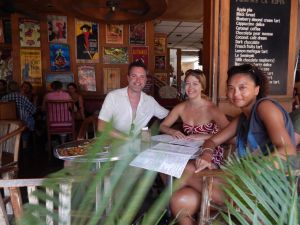 But walking around Kuta, granted the slaggy tourist mecca of Bali, I see tourists selectively spending their money. They stride past the older restaurants owned by a local family and breeze in to McDonalds, or the clean upscale Australian owned Buddha Bar. Locally owned guesthouses that don’t have the money for brand new street signs are passed by; cafes that don’t have the latest fashionable colours in the window are skipped; and anywhere that even hints of unwashed hands is ignored. Understandably I suppose, tourists shop with the standards of home. If a local wants to attract tourists (not travelers!) she must upgrade her shop to the standards we expect in a fine shopping establishment.
But walking around Kuta, granted the slaggy tourist mecca of Bali, I see tourists selectively spending their money. They stride past the older restaurants owned by a local family and breeze in to McDonalds, or the clean upscale Australian owned Buddha Bar. Locally owned guesthouses that don’t have the money for brand new street signs are passed by; cafes that don’t have the latest fashionable colours in the window are skipped; and anywhere that even hints of unwashed hands is ignored. Understandably I suppose, tourists shop with the standards of home. If a local wants to attract tourists (not travelers!) she must upgrade her shop to the standards we expect in a fine shopping establishment.
 Street vendors are everywhere – I say “street vendor” to describe a vendor that doesn’t have the money to buy a front wall, tight fitting door and an air conditioner. Many of these vendors sell cheap watches, tank-tops, “Bogganware”, wooden penis bottle openers, sarongs, etc. With 5 of these shops in a row, each merchant must sit on the street encouraging each passer-by to explore his or her shop. But as a passer-by, how many times do I need to look at the same stuff to know I’m not going to buy any of it? So I walk on, ignoring their promises of unmatched bargains, to, presumably, take my money elsewhere.
Street vendors are everywhere – I say “street vendor” to describe a vendor that doesn’t have the money to buy a front wall, tight fitting door and an air conditioner. Many of these vendors sell cheap watches, tank-tops, “Bogganware”, wooden penis bottle openers, sarongs, etc. With 5 of these shops in a row, each merchant must sit on the street encouraging each passer-by to explore his or her shop. But as a passer-by, how many times do I need to look at the same stuff to know I’m not going to buy any of it? So I walk on, ignoring their promises of unmatched bargains, to, presumably, take my money elsewhere.
Tour guides, taxi and scooter drivers, drug dealers and night club enticers call out to us in turn, hoping to catch our attention. Street kids try to sell hand-made bracelets for $1, homeless mothers ask for 10,000Rp, bars blast music, scooters zoom by, and the chaos begins to numb our senses. In effect, we switch off, stop looking and listening, and head towards any air conditioned shop-with-a-storefront we can find. No haggling in these shops mind you – they’re “not that kind of place”.
When the heat, the noise, the endless calls to shops and the smells of incense become too much, what is a civilized person to do but head to a brand new indoor nice-and-quiet shopping mall with recognizable brands, “safe” food from home (the same processed, fast-food crap that is spreading like a global virus), and calm, peaceful shopkeepers sporting the latest fashions? The same shops, the same sales, the same marketing propaganda, the same smells.
As more $200/night hotels are built (one is going up next to our 45-year old, $18/night, locally owned resort as we speak) more locals will be forced to compete for even more snobby tourists with even more selective spending habits; travelers will stop coming because it won’t be the “cheap” South East Asia it is today; store-frontless shops will knocked down in the name of “progress’; but the locals will still have to live here, still have to eat here, and still have to earn a living. Somehow.
The wealth disparity between those rich enough today to tap in to the tourist spending patterns will prosper, the rest will suffer. Those that own land will sell for profit, those that own cars might move away, but those that have nothing today will have even less when the tourism industry is finished with them.
All in the name of middle-class progress, profit-above-people economics, global brand recognition, and endless, mindless, consumer spending.
While I believe Social Enterprises will help shift the problem by relegating profit to a tertiary corporate priority, real change will come when, individually, tourists realize that they have a responsibility to the places they visit. To shop at locally owned, not corporately owned, establishments. To avoid “chain” hotels and spend their money at independent ones. To talk to locals, learn their language and ask what they can do to help. To buy less crap and pay for more local art and services.
Even in the third world, just like at home, by spending our money with locally owned businesses we offer small business owners a chance to reinvest in their businesses and compete with the global chains who are focused only on profit and brand-domination. Sure, we must “sacrifice” some “convenience” to revel in the cultures and customs of distant lands, but isn’t that why we left home in the first place? We must value the uniqueness of where we visit, and put a stop to the global virus of consumerism and brand recognition that is making the entire planet look like a big dirty shopping mall.
Most importantly we must look up. We must make eye contact, put down our phones, talk to strangers, ask questions, and enjoy the luxury of the wealth of the freedom to explore our wonderful world.
Until then, I’m off to find one of my friendly neighbourhood beach bartenders to watch the sun set over the beautiful ocean beside this beautiful country beside my beautiful wife.

